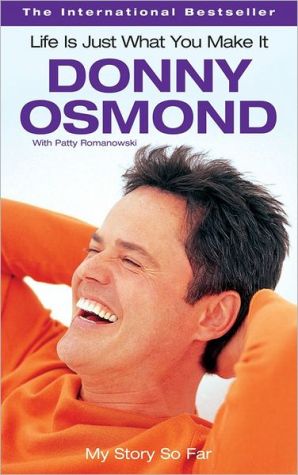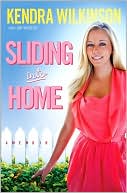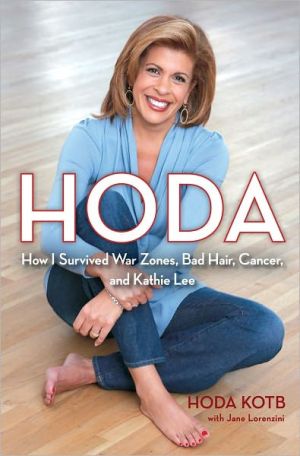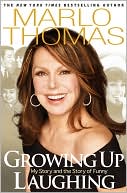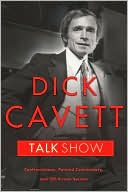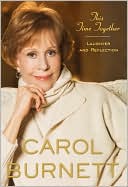Life Is Just What You Make It: My Story So Far
For the first time in trade paperback, entertainer, singer, and pop culture icon Donny Osmond returns to bring his life story up-to-date\ Donny Osmond has been a superstar since the age of six -- one of the few child stars whose popularity has endured for four decades. He's been a teen idol, a Broadway actor, and a talk show host, and to this day is still touring to sold-out crowds. This new edition of his acclaimed memoir fills in the gaps for his millions of fans, with three new chapters...
Search in google:
For the first time in trade paperback, entertainer, singer, and pop culture icon Donny Osmond returns to bring his life story up-to-dateDonny Osmond has been a superstar since the age of six -- one of the few child stars whose popularity has endured for four decades. He's been a teen idol, a Broadway actor, and a talk show host, and to this day is still touring to sold-out crowds. This new edition of his acclaimed memoir fills in the gaps for his millions of fans, with three new chapters providing more fun, more revelations, more faith, more love, and more laughter.Donny Osmond recently completed a sold-out U.K. concert tour and will be playing an extended run in Las Vegas around publication time. In 2005, he released his fifty-fourth album, What I Meant to Say. He lives in Utah with his family. Publishers Weekly "Change your name. Your name is poison," advised Michael Jackson when Donny Osmond was trying to forge an adult singing career in 1983. Osmond's name was not always a punch line. At the age of five, he joined his four older siblings as the pop group The Osmonds. Barely in his teens, Donny became a solo artist, cutting more than 20 gold records by the mid-'70s. From 1976 to 1979, he and his sister starred in the popular, campy TV variety series The Donny & Marie Show. But his toothy, wholesome image and his strict religious beliefs as a member of the Church of Jesus Christ of Latter Day Saints were at odds with the harder-edged rock of that era. This, and the fact that the Osmond entertainment empire was located in distant Utah, fostered the impression that he was a has-been by age 22. Osmond's emotionally raw and startlingly candid autobiography is a difficult tightrope act: a triumph-of-the-spirit tale that avoids homilies or bitterness. Taught to ignore his own feelings in favor of the interest of the family, Osmond was a child star under enormous pressure to be "perfect." His debilitating panic attacks (which plagued his five-year run in Andrew Lloyd Webber's Joseph and the Amazing Technicolor Dreamcoat) and his efforts to find emotional peace through psychotherapy are recounted with bracing honesty, and he provides keen insights into the music business, especially the behind-the-scenes politics that govern radio airtime. By the end of his story (so far), Osmond's long-sought inner peace includes the understanding that he can't control how he is perceived by the public. Writing this book may have been the best form of therapy for Osmond, but it will prove a revelation to readers as well. (June) Copyright 1999 Cahners Business Information.
An Excerpt from Life is Just What You Make It\ Chapter One\ I guess the beginning is always a good place to start.\ I was born on December 9, 1957, in Ogden, a small community in the northeast corner of Utah. My family lived in a four-bedroom house at 228 North Washington Boulevard. We had a large plot of land, with apple, peach, and cherry trees, raspberry bushes, and room enough to keep rabbits and a cow. Several years ago, I went back to visit that little house, and nothing was the same. But for me as a child, this was a magical and very special place. It was in this house that I'm convinced I saw Santa's sleigh alight from the winter sky (and I know this is true, because I heard the sleigh bells and my brother Jay saw a reindeer lick our window). In the sandbox right outside the kitchen window, I passed some of the best afternoons of my life. But when and where I was born are just details. The real story of my life begins with the family I was born to, the Osmonds.\ My parents, George Virl Osmond and Olive May Davis, met shortly after World War II. My father served during the war, and earned the rank of sergeant. He met my mother in Ogden, where she lived with her parents and brother, after he received an honorable discharge because of health problems. Although my parents were of similar backgrounds and beliefs, their family experiences could not have been more different. My mother grew up in a loving home, the daughter of schoolteachers. In contract, my father had a far less happy childhood. His father died when he was a baby, and neither of his two stepfathers loved him. In fact, as a young boy, Father was forced to sleep on an unheated porch and live on milk and bread. He was barely a teenager when he had to leave his home and find his own way in the world, alone. It's a great tribute to my father and says a lot about him that those painful early experiences did not darken his view of the world. However, the uncertainty of his early life made Father a person who would always be uncomfortable with disorder and driven to let the world see only the best in himself and in his family.\ As my parents got to know each other, they discovered that they shared the same dream: to have a large family. Mother recalled a large neighbor family she knew as a child and how she enjoyed being invited over to join in the fun. Today she laughs to think that five children seemed like so many; little did she know that she would become the mother of nine.\ My parents' desire to raise so many children is deeply rooted in our church, The Church of Jesus Christ of Latter-day Saints. Our church members are more commonly referred to as "Mormons," and while that's a widely used term, it's technically incorrect. There are two popular misconceptions about our church that I'll lay to rest right here: Yes, ours is a Christian church, and, no, we do not practice polygamy. (The fact is, only a relatively small number of church members did so prior to the late 1800s when the Church decreed the practice unacceptable.)\ More important to my story are the positive values our Church taught, and at the center of it all is a view of the world that looks beyond today and considers what I like to call "the big picture." From the time we were very young, Mother and Father always talked very openly about our faith and its teachings. They told about how their was not just a marriage made here on earth, but a celestial marriage, a "sealing" together for eternity. And as their children, we are sealed to them and to one another forever, as our future spouses, children, grandchildren, and succeeding generations all will be. Our religious beliefs influenced everything in our lives. For example, I will always refer to my parents as "Father" and "Mother," because Father considered "Dad" and "Mom" disrespectful. "You don't say, 'Our Dad who art in Heaven,'" he reasoned.\ I admit that this is the "short course" on my religious beliefs. It would take many books to explain it all, and I'm not here to proselytize. But a basic understanding of our values goes a long way toward understanding how our lives would unfold. We grew up knowing that life in this world passes in the blink of an eye. Over the years, people have marveled at how my parents managed to raise what is often considered an oxymoron: a loving, happy show-business family. Many factors played a part in my parents' ability to success as parents while their children succeeded in a very rough, sometimes shady business. At the core of it was our belief that life's material rewards are ephemeral. There's a saying I've sen quoted in many places and in many different contexts: "No success can compensate for failure in the home." This was uttered in the late 1960s by a former president of our Church. It expresses precisely the guiding principles my parents and now my siblings and I try to follow in our own families.\ By any measure, my parents are conservative, but that didn't prevent them from seeing life as a great adventure. I've never known them to hesitate to turn a new corner or take an uncharted road. They are indefatigable optimists. Mother had the faith to endure any setback with her ardent belief that, as she often said, "This too shall pass," a sentiment that I admit did not always console me. Another, which I think betrays her down-to-earth outlook, is "tragedy plus time equals humor." Mother has a free, infectious laugh like no one I've ever known.\ My parents' unwavering faith in the future was tested early in their marriage when they learned that my two eldest brothers, Virl (who was born in October 1945) and Tom (born almost exactly two years later, in October 1947), were hearing impaired. For reasons no one knows, Virl was born with a substantial hearing loss, and Tom has practically no hearing at all. Though heartbroken, as any parents of a disabled child would be, Mother and Father stood firm. They ignored the advice of experts who urged them to lower their expectations for Virl and Tom and to consider institutionalizing them. They were told that this would be best for my brothers, since they probably would never learn to speak. They tried persuade my parents to accept Virl's and Tom's limitations.\ But my parents believed that Virl and Tom could learn to speak and to thrive in a hearing world. They never said it would be easy, and at times it wasn't. Mother learned everything she could about teaching her sons, then she relied on her own mother's intuition and common sense to devise very clever, innovative ways of helping them. My parents transformed a room in our home into a schoolroom, complete with blackboard, desks, and books, so that Mother could instruct them at home. It was a special place where we could do our homework and where Mother, who was a natural teacher, could help us with our studies. (every home we lived in after that included a similarly appointed room.)\ The point is that my parents never gave up. And they taught us never to give up either. Father had a saying that I'll never forget: "Don't aim for the moon, aim for the stars." It's a philosophy I think we all took to heart, because it encouraged us to set our sights higher and reflected the confidence our parents had in us. There were many wonderful gifts we all received from Father and Mother, but perhaps the greatest was their faith in us. They were the first people to tell us we could achieve anything we set our sights on, and they created a supportive home environment in which we thrived.\ \ \ \ As the seventh child, I joined a family already in full swing: my brothers Virl, twelve; Tom, ten; Alan, eight; Wayne, six; Merrill, four; and Jay, more than two and a half. I don't recall too many specific incidents from those very early years, only a general impression of a household brimming with activity and love. With so many of us, my ever-practical, highly organized parents relied on schedules and routines to keep the household running. Both Father and Mother are very hardworking, industrious people. Father turned his hand to insurance, real estate, and advertising sales, in addition to serving as postmaster and being very active in our church. Mother helped keep his books, handled the clerical duties, and was quite knowledgeable about business as well.\ Mother and Father made sure we were always involved in some constructive activity and always learning, if not by example or through lesson, then by osmosis. Mother loves collecting inspirational and insightful quotations, bits of wisdom that she would write on a kitchen wall painted with blackboard paint. (Never one to fall behind the times, Mother now posts these on her website.) On this board, she would also write out multiplication charts and complex sentences, that she would diagram the old-fashioned way, with the part of the speech branching out on diagonal lines (which I could never figure out). My earliest lessons of life: how to care for animals and the garden, how to organize, how to build and repair things.\ When I think of home then, I think of the security I felt, being watched over by two loving parents and six older brothers. In the traditions of the teachings we followed, older siblings had authority over younger ones. this was a great way for kids to learn responsibility, but from my low spot on the family totem pole, I sometimes felt as if I ad eight parents, not two. Although in later years, Virl and Tom remained largely out of the spotlight (they performed with us only occasionally; both dance and play instruments), at home they assumed their rightful place as our older brothers. Virl is twelve and Tom ten years older than I, so we were never close in a buddy-buddy way, but I love and admire them. I always considered Virl the most handsome in our family, and I looked up to him because, in my young eyes, he was so accomplished and responsible. I admired Tom for his courage and determination. In addition to our close physical resemblance, Tom and I share a degree of fearlessness.\ I remember once when I was about eight and we were living in California. Father and Mother took Virl and Tom somewhere and left us home alone with Alan, or Big Al, as we call him, in charge. Suddenly we heard sounds at the back door, like someone was trying to break into the house. Alan immediately phoned the number where my parents were, and they raced home. In the meantime, it was up to Alan to hold the fort.\ "Everybody go get knives!" Alan, our fearless leader, commanded, and we scrambled for the kitchen drawer to arm ourselves. It sounded like a good idea at the time, but it's hard to imagine how the sight of seven kids wielding butter knives would have deterred anyone. We gripped our weapons tensely the scratching sounds grew more persistent. We stood poised to attack when, thanks goodness, Father and Mother pulled up. The burglar heard them and tried to run for it. Without knowing whether the intruder was armed, Tom leapt from the car and chased him away. Until then, this was the most dramatic moment of my life. When Tom returned, he was my hero.\ Another time I'll never forget, I was sitting in the third, rear-facing, fold-down seat in our station wagon. My parents avoided a lot of bickering by giving us assigned seats, and as one of the youngest kids, I was relegated to the "cheap seats," you could say. I don't recall the incident, but somehow Father incurred the wrath of another driver who, assuming he wouldn't be heard, let loose with a stream of profanities. Of course, Virl and Tom were trained to read lips, but when Father asked them what the guy had said, Tom replied, "You don't want to know," and we all laughed. We knew those words existed, but we could never, ever say them....\ Excerpted by permission of Hyperion. Copyright © 1999 Donald Clark Osmond.
\ From Barnes & NobleDonny Osmond has had a show-business career that's spanned more than 35 years. A TV star by six, a Las Vegas veteran by eight, Osmond enjoyed success in tandem with his brothers, his sister, and as a solo act. He had 23 gold records by the age of 13. And just when the music industry was ready to write him off as a has-been, he reached No. 2 on the charts with the song "Soldier of Love." Now Osmond recounts those successes (and not a few setbacks along the way) in Life Is Just What You Make It.\ \ \ \ \ Publishers Weekly - Publisher's Weekly\ "Change your name. Your name is poison," advised Michael Jackson when Donny Osmond was trying to forge an adult singing career in 1983. Osmond's name was not always a punch line. At the age of five, he joined his four older siblings as the pop group The Osmonds. Barely in his teens, Donny became a solo artist, cutting more than 20 gold records by the mid-'70s. From 1976 to 1979, he and his sister starred in the popular, campy TV variety series The Donny & Marie Show. But his toothy, wholesome image and his strict religious beliefs as a member of the Church of Jesus Christ of Latter Day Saints were at odds with the harder-edged rock of that era. This, and the fact that the Osmond entertainment empire was located in distant Utah, fostered the impression that he was a has-been by age 22. Osmond's emotionally raw and startlingly candid autobiography is a difficult tightrope act: a triumph-of-the-spirit tale that avoids homilies or bitterness. Taught to ignore his own feelings in favor of the interest of the family, Osmond was a child star under enormous pressure to be "perfect." His debilitating panic attacks which plagued his five-year run in Andrew Lloyd Webber's Joseph and the Amazing Technicolor Dreamcoat and his efforts to find emotional peace through psychotherapy are recounted with bracing honesty, and he provides keen insights into the music business, especially the behind-the-scenes politics that govern radio airtime. By the end of his story so far, Osmond's long-sought inner peace includes the understanding that he can't control how he is perceived by the public. Writing this book may have been the best form of therapy for Osmond, but it will prove a revelation to readers as well. June Copyright 1999 Cahners Business Information.\ \ \ Library JournalLittle Donny Osmond, whose toothy grin graced posters on many pre-teens' bedroom walls, is all grown up. He started his singing career at the age of five and eventually broke out as a teen idol, earning 23 gold records by the time he was 13. In the 1970s, Donny and his sister Marie hosted a popular television program. But his singing style and goodie-goodie image didn't fare well in the 1980s, and his career plummeted. He got a chance to make a comeback when he was offered the lead in Joseph and the Amazing Technicolor Dreamcoat. Gossip mavens won't find much here; Donny is as squeaky clean as his image implies. However, this is a surprisingly open and sincere look at the life of a child star whose early fame came and went including a hint of resentment about having to work so hard so young, and the effort it took to get back on top. A good addition to inspirational as well as celebrity biography collections.--Rosellen Brewer, Monterey Bay Area Cooperative Lib. Syst., Pacific Grove, CA Copyright 1999 Cahners Business Information.\ \
